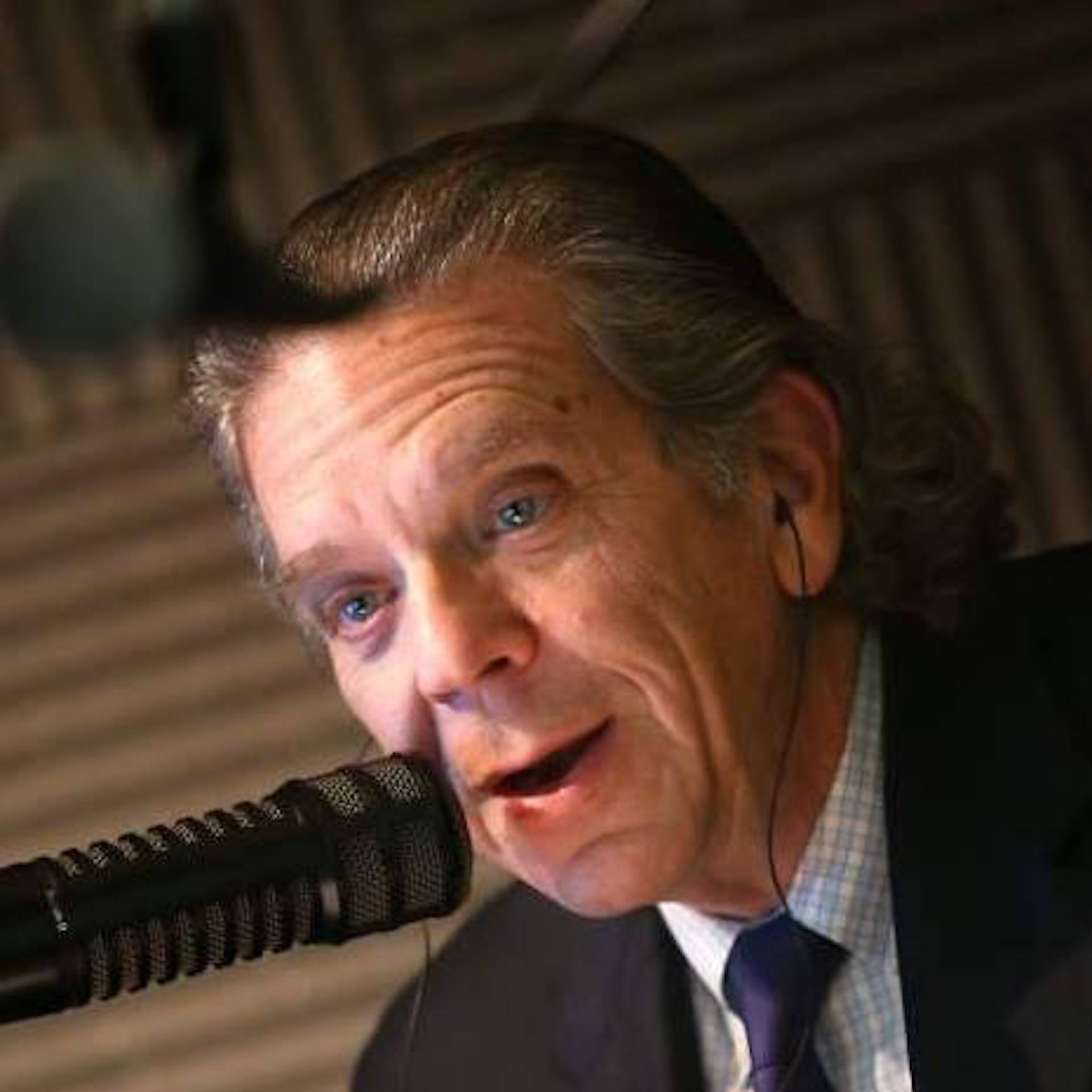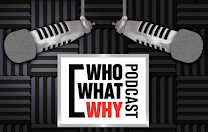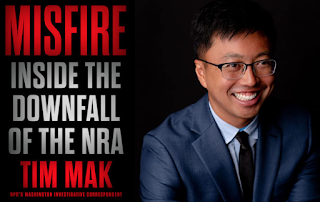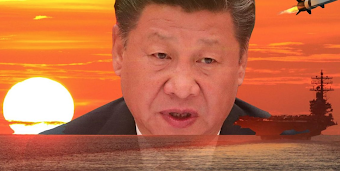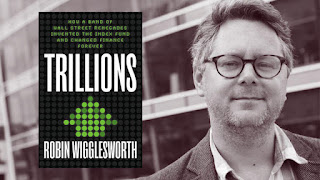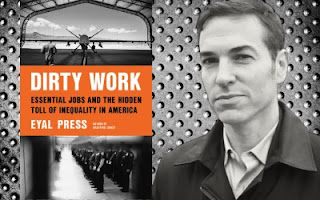Episodes
Monday Apr 18, 2022
The Pandemic Profiteers: A Conversation with J. David McSwane
Monday Apr 18, 2022
Monday Apr 18, 2022
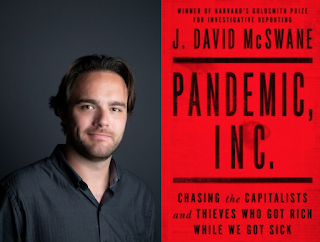 Even if the details were never reported in real-time, you knew instinctively during the chaos of the early days of the Pandemic, in the winter of 2020, that some people would get rich. Testing, PPE, Government loans, PPP, small business loans, and all overseen by Donald Trump and his cronies. What could possibly go wrong?
Even if the details were never reported in real-time, you knew instinctively during the chaos of the early days of the Pandemic, in the winter of 2020, that some people would get rich. Testing, PPE, Government loans, PPP, small business loans, and all overseen by Donald Trump and his cronies. What could possibly go wrong?
Obviously, a lot did go wrong. As a result, many died and many got rich. The pandemic in a way gave rise to a group of American oligarchs, many with a checkered history at best, who took advantage of both the inherent corruption and the blatant incompetence of the administration.
And yet the stage was set for it all, by mistakes over the years that were made by both political parties and even some politicians with better intentions.
Now, as the dust settles the story of what became Pandemic Inc. is being told by J. David McSwane.
My conversation with David McSwane:
Thursday Apr 14, 2022
Thursday Apr 14, 2022
 Cryptocurrencies, NFTs, Dows, and the blockchain they ride on are still, in the view of many, the decentralized financial instruments of the future. Even if they never replace the fiat currencies of nations, their roles in markets are here to stay.
Cryptocurrencies, NFTs, Dows, and the blockchain they ride on are still, in the view of many, the decentralized financial instruments of the future. Even if they never replace the fiat currencies of nations, their roles in markets are here to stay.
And crypto, like everything else, has become politicized. You would think that an asset class that is almost pure speculation and not even about owning anything would be immune from the primal forces of partisanship. But no, both the left and the libertarian right have very different views of what crypto and its sister products on the blockchain and Web 3.0 should be.
Few have been harder than the left, who sees in it some kind of pure evil of the market. The good news is that when my guest — author, thinker, and all-around wiseman — Daniel Pinchbeck talks about the politics of crypto, he also helps us to understand what it really is, why it matters and why to the folks on all political sides it should matter in the future.
Daniel Pinchbeck has long been considered a Renaissance man and ahead of his time. He’s the author of the books Breaking Open the Head, The Return to Quetzalcoatl, Notes from the Edge of Time, How Soon is Now, and When Plants Dream. He saw around corners long before many others with respect to our ecological crisis and was a one-time executive director of the Center for Planetary Culture.
His essays and articles have appeared in every major publication. He’s spoken at conferences around the world and had his work featured in a 2010 documentary. He currently writes the Daniel Pinchbeck Newsletter on Substack.
Tuesday Mar 22, 2022
A Nostalgia For the Journalism of Old: A Conversation with Brian Karem
Tuesday Mar 22, 2022
Tuesday Mar 22, 2022
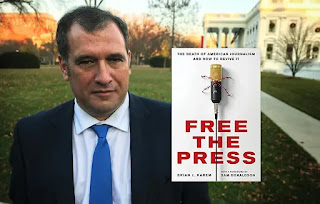 For journalism, it may be the best of times and the worst of times. On the one hand the national media is more vibrant than ever before. The NYT, the Washington Post, the Wall Street Journal, as well as broadcast news and cable news networks are thriving, even amidst the post Trump drop in ratings.
For journalism, it may be the best of times and the worst of times. On the one hand the national media is more vibrant than ever before. The NYT, the Washington Post, the Wall Street Journal, as well as broadcast news and cable news networks are thriving, even amidst the post Trump drop in ratings.
For these outlets the transition to digital has been painful but successful. In other efforts, recurring revenue models are driving the success of independent news outlets as well as individual journalists on Substack and similar platforms.
While romantics, like my guest Brian Karem rap quixotic about the 23 newspaper that once were available in New York, news websites and Twitter have now subsumed that, while new sites start up regularly with lower barriers to entry. In his new book Free The Press, Brian Karem argues that journalism, particularly local journalism, is dying and that he has a specific, if very traditional formula to save it.
My conversation with Brian Karem:
Thursday Mar 10, 2022
Corruption is America’s Operating System: A Conversation with Sarah Chayes
Thursday Mar 10, 2022
Thursday Mar 10, 2022
 Historian and journalist Sarah Chayes, argues that we can’t fix our floundering democracy until we face — and fix — our current levels of corruption.
Historian and journalist Sarah Chayes, argues that we can’t fix our floundering democracy until we face — and fix — our current levels of corruption.
In her view, we are in a “pandemic of corruption,” fostered by a network of corrupt businesses and political leaders worldwide. Before we can begin to set things right, however, we first have to grasp what modern-day corruption really is.
Behind this evolving crisis, says Chayes, is a shift in the very definition of power. Where society’s leaders once at least paid lip service to the concept of public service, today the only measure of social status, she contends, is money: The pursuit of power has turned into a no-holds-barred scramble for more and more wealth.
Chayes, the author of On Corruption in America, explains how we got here, and how we must build a coalition of integrity that transcends ideology, one that has its roots in equity and the public interest.
Wednesday Mar 02, 2022
The Battle of Banks Not Tanks: A Conversation with Bill Browder
Wednesday Mar 02, 2022
Wednesday Mar 02, 2022
 Beyond the minute-by-minute reporting of the ground war, the Twitter feeds, TickTock images, there are broader and more economically complex issues surrounding the war in the Ukraine, and the world’s response to it. Issues that include sanctions, the SWIFT system, and the seizure of assets, including yachts and private planes parked around the globe.
Beyond the minute-by-minute reporting of the ground war, the Twitter feeds, TickTock images, there are broader and more economically complex issues surrounding the war in the Ukraine, and the world’s response to it. Issues that include sanctions, the SWIFT system, and the seizure of assets, including yachts and private planes parked around the globe.
All part of the interconnectedness of a global economic structure that Russia, for better or worse, has been a part of. Few understand the intricacies of these connections better than Bill Browder. Years ago, Browder made millions in Putin’s Russia. What he didn’t know was what kind of price he would pay for getting involved in the ever-entangling web of Putin and his oligarchs.
The ultimate result was the brutal death of Browder’s lawyer and friend Sergei Magnitsky, who was murdered in prison after uncovering a multi-million dollar fraud committed by Russian government officials. Browder has carried on Magnitsky’s legacy, at great personal risk to himself. That legacy and the Magnitsky Act is a large part of the basis of the sanctions that we’ve been talking about.
Long before current events, Browder’s been leading a campaign to expose Russia’s endemic corruption and human rights abuses. He’s the author of the international bestseller Red Notice and the soon-to-be-published Freezing Order.
Monday Feb 28, 2022
Recipe for Survival: A Conversation with Dana Ellis Hunnes:
Monday Feb 28, 2022
Monday Feb 28, 2022
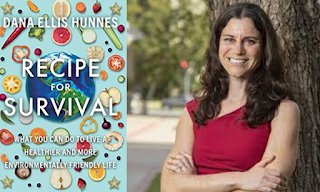 All the way back in 1971, with the publication of Frances Moore Lappe’s Diet for Small Planet, the world began to take notice of the connection between what we eat, who we are, our environmental future, and the sustainability of our food supply.
All the way back in 1971, with the publication of Frances Moore Lappe’s Diet for Small Planet, the world began to take notice of the connection between what we eat, who we are, our environmental future, and the sustainability of our food supply.
Since then, the external forces that impact all of these things have brought more pressures to bear. The state of our climate and its consequences, the quality of our food, and how long we live are all going in the wrong direction. Even more problematic is that each seems to be siloed.
Dana Ellis Hunnes, in her new book, Recipe for Survival, takes a more modern and holistic approach in looking at ways to improve our health and at the same time improve the health of our planet.
My conversation with Dana Ellis Hunnes:
Wednesday Feb 23, 2022
Tell Me A Story: A Conversation with Frank Rose
Wednesday Feb 23, 2022
Wednesday Feb 23, 2022
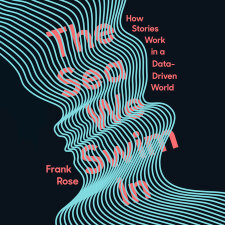 It’s the power of narrative that shapes every aspect of our lives. We rush to tell stories to our friends and family to validate our experiences. We buy products and brands because of the story they tell us. We vote, make friends, and even enemies, because of the stories that we believe.
It’s the power of narrative that shapes every aspect of our lives. We rush to tell stories to our friends and family to validate our experiences. We buy products and brands because of the story they tell us. We vote, make friends, and even enemies, because of the stories that we believe.
Narrative has an emotional pull on us. Sometimes we take away joy, anger, laughter, or sadness. People don’t rush out in large numbers to see PowerPoints, policy discussions, or even most documentaries. But they will react to drama, comedy, or horror. They will like or dislike social media, based on the stories they have ingested.
It all sounds so simple, so logical, but it’s often lost in the cacophony of noise, data, and information that surrounds us.
Frank Rose writes about this in his new book The Sea We Swim In: How Stories Work in a Data-Driven World
Monday Feb 14, 2022
Monday Feb 14, 2022
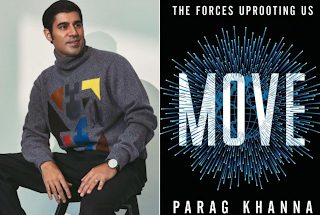 At no time in civilization have so many forces been at play in reshaping the world. The complexity of everything is growing. Global geopolitical risks are rising. Technologies are impacting everything and creating new anxiety. Climate change is reshaping our very topography. The economic gap within and between nations is rising, and a younger generation feels alienated from being able to control the levers that will shape their changing future. Arguably, this convergence of forces and events is having precisely the wrong effect in parts of the world.
At no time in civilization have so many forces been at play in reshaping the world. The complexity of everything is growing. Global geopolitical risks are rising. Technologies are impacting everything and creating new anxiety. Climate change is reshaping our very topography. The economic gap within and between nations is rising, and a younger generation feels alienated from being able to control the levers that will shape their changing future. Arguably, this convergence of forces and events is having precisely the wrong effect in parts of the world.
Instead of huddling together to take on these challenges, our anxiety and alienation has made the world more tribal, more fearful, more nationalistic, and we see the worst of populism on the rise. Rather than seeing the world and all this change as an opportunity, too many want to dig in, shelter in place, and simply be angry. How we move on from this is the work and insight of visionary futurist Parag Khanna. Khanna's latest book is Move: The Forces Uprooting Us.
Friday Feb 04, 2022
Friday Feb 04, 2022
 The story of how the world's oldest living language adapted to the modern world is one that carries within it the story of how language itself shapes our vision and our thinking. How the quest for progress is often stronger than the pull of history. It’s how a language can literally be reinvented, iterated and adapted, and at the same time carry a country along with it.
The story of how the world's oldest living language adapted to the modern world is one that carries within it the story of how language itself shapes our vision and our thinking. How the quest for progress is often stronger than the pull of history. It’s how a language can literally be reinvented, iterated and adapted, and at the same time carry a country along with it.
That is the story of the evolution of the Chinese language that my my guest Jing Tsu tells in her new book Kingdom of Characters: The Language Revolution That Made China Modern
My conversation with Jing Tsu:
Tuesday Jan 25, 2022
Tuesday Jan 25, 2022
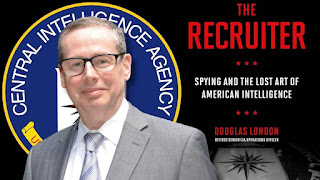 For as long as humans have interacted with each other, spies in one form or another, have been with us. To quote the legendary John le Carre, “Jesus had only twelve friends over for dinner, and still one of them turned out to be a double agent.”
For as long as humans have interacted with each other, spies in one form or another, have been with us. To quote the legendary John le Carre, “Jesus had only twelve friends over for dinner, and still one of them turned out to be a double agent.”
And while the nature of spy-craft has evolved, its fundamental missions remain the same. To gather actionable information. To get results.
So when we look at our failure to fully understand the Soviet Union during the Cold War, our inability to understand what to expect in Afghanistan, our shock with the recent Chinese hypersonic missile launch, and the lack of certainty as to what the Russians are planning in Ukraine, what does it say about the state of American intelligence?
Today we’re told that technology is the successor to human intelligence, but what has that wrought, and doesn't it still take humans, and their infinite capacity for suspicion, to understand and interpret that data?
Retired CIA officer Douglas London write about this in his new book The Recruiter: Spying and the Lost Art of American Intelligence.
Thursday Jan 13, 2022
Politics Without Celebrity - Kati Marton’s The Chancellor
Thursday Jan 13, 2022
Thursday Jan 13, 2022
 Imagine a political leader that is not about celebrity or attention? In a time when we have elected a reality show star as President, when celebrity politics is the lifeblood of the American political class, it’s hard to imagine a politician or world leader whose life is private; who keeps their own counsel, who listens first, who shuns celebrity, and yet proves powerful as a leader.
Imagine a political leader that is not about celebrity or attention? In a time when we have elected a reality show star as President, when celebrity politics is the lifeblood of the American political class, it’s hard to imagine a politician or world leader whose life is private; who keeps their own counsel, who listens first, who shuns celebrity, and yet proves powerful as a leader.
Such was Angela Merkel, who served for 16 years as German Chancellor. Its first and only woman Chancellor, and without questions the glue that held parts of the world and certainly the Western Alliance together for many years.
What can we all learn from this Greta Garbo of geopolitics? To find out we have to dip into Kati Marton’s new biography of Merkel, The Chancellor: The Remarkable Odyssey of Angela Merkel
Tuesday Jan 04, 2022
January 6th Was a Rallying Point For White Hot Hate
Tuesday Jan 04, 2022
Tuesday Jan 04, 2022
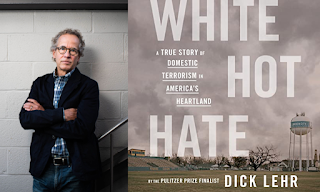 As we witnessed on January 6th, the level of hostility and anger awash in the country today has real consequences. Demagogues and hateful rhetoric have real power. And while some argue that history teaches us that such rage burns white-hot and then dies out, what happens while it's burning hurts people and sometimes changes nations.
As we witnessed on January 6th, the level of hostility and anger awash in the country today has real consequences. Demagogues and hateful rhetoric have real power. And while some argue that history teaches us that such rage burns white-hot and then dies out, what happens while it's burning hurts people and sometimes changes nations.
It’s really no different than when we see protestors in other countries attacking America, burning the American flag, and taking Americans hostage.
In a world moving at the speed of light, tribalism, and hatred for the other, for those that are different, are everywhere. Even in a small Kansas town,
That is the story that Dick Lehr tells us in White Hot Hate: A True Story of Domestic Terrorism in America’s Heartland.
Monday Dec 27, 2021
Monday Dec 27, 2021
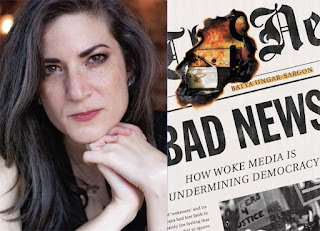 Too often when talking about the media and journalism we engage in a board discussion of ideas, policy, and how the levers of power really work
Too often when talking about the media and journalism we engage in a board discussion of ideas, policy, and how the levers of power really work
What we often forget is that all of this is made up of people. People who bring to the exercise of power and of reporting on it, their own values, education, and personal history.
In that fact lies much of what is wrong with the media today. It's how we lost sight of the power of class in journalism, why we’ve tried to bury class differences inside racial differences and wokeness.
If all of this sounds too nuanced, Batya Ungar-Sargon, the deputy opinion editor of of Newsweek, helps us understand how it’s shaping our media and democracy in her new work Bad News: How Woke Media Is Undermining Democracy
My conversation with Batya Ungar-Sargon:
Wednesday Dec 15, 2021
The Modern Era of Television Begins with HBO: A Conversation with James Andrew Miller
Wednesday Dec 15, 2021
Wednesday Dec 15, 2021
The story of HBO, and the way in which it disrupted television, beginning back in the early 1970s, is perhaps the penultimate example.
Just as today we are going through a sea change with respect to how stories are delivered to us, HBO was the creative destruction of its day. Its motto, like Facebook, could easily have been “move fast and break things.”
And just as HBO disrupted television. Blockbuster would eventually disrupt HBO, Netflix would disrupt Blockbuster, and technology and streaming would disrupt everything. But in many ways the story all starts with HBO.
That’s the story that James Andrew Miller tells in his comprehensive and entertaining oral history Tinderbox: HBO's Ruthless Pursuit of New Frontiers
Tuesday Dec 07, 2021
The Shattering: America in the 1960‘s: A Conversation with Kevin Boyle
Tuesday Dec 07, 2021
Tuesday Dec 07, 2021
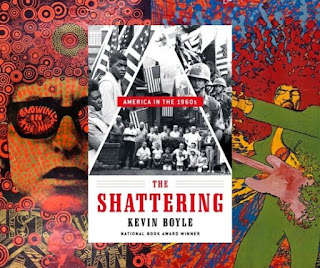 Think of all that has changed as a result of startups and creative destruction. Nothing is the same as it was because of the sometimes revolutionary ideas of entrepreneurs.
Think of all that has changed as a result of startups and creative destruction. Nothing is the same as it was because of the sometimes revolutionary ideas of entrepreneurs.
In a similar way the 1960s were a time of creative destruction for America and the world. The post war paradigms that had shaped the country through the late 40’s and early 50’s were shattered. And just as today we are struggling, socially, politically and economically to come to grips with the our technology disruption, on a grander scale we are still trying to come to grips with the social and political shattering of the 60’s
We explore this with National Book Award winner Kevin Boyle, whose new book is The Shattering: America in the 1960s
Wednesday Dec 01, 2021
The Post-Pandemic Normal Will Never Be the Way It Was
Wednesday Dec 01, 2021
Wednesday Dec 01, 2021
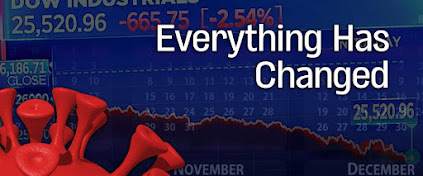 Everyone desperately wants to know what the post-pandemic world will look like. Adam Tooze has been thinking hard about it and he thinks he knows.
Everyone desperately wants to know what the post-pandemic world will look like. Adam Tooze has been thinking hard about it and he thinks he knows. Comparing the US experience to China’s, he notes how cultural and political differences have determined successes and failures in dealing with the unprecedented challenge of COVID-19. Tooze argues that, like soldiers returning from mortal combat, we are suffering from a kind of national — and even global — PTSD.
Tooze, Columbia University history and economics professor is the author of Shutdown: How Covid Shook the World's Economy.
My WhoWhatWhy conversation with Adam Tooze::
Tuesday Nov 30, 2021
Has the Death of Faith Made Us More Tribal?
Tuesday Nov 30, 2021
Tuesday Nov 30, 2021
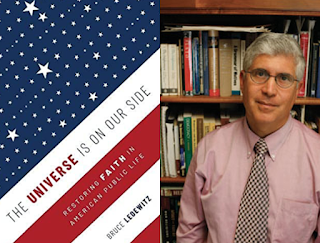 In The Universe Is on Our Side: Restoring Faith in American Public Life Bruce Ledewitz argues that there has been a breakdown in American public life that is beyond issues or politics. He argues that America is living with the consequences of the death of faith, which Nietzsche presumed would be momentous and irreversible.
In The Universe Is on Our Side: Restoring Faith in American Public Life Bruce Ledewitz argues that there has been a breakdown in American public life that is beyond issues or politics. He argues that America is living with the consequences of the death of faith, which Nietzsche presumed would be momentous and irreversible.
According to Ledewith, America's future requires that we begin a new story by asking a question posed by theologian Bernard Lonergan: Is the universe on our side?
My conversation with Bruce Ledewitz:
Friday Nov 19, 2021
Friday Nov 19, 2021
But how did this power evolve, and what led to its downfall. What was behind its scorched earth “never give an inch” philosophy and was it simple greed and old fashioned corruption that brought it down?
Four years of research have given my guest NPR Washington investigative correspondent, Tim Mak some answers to these and many other questions. He details them in Misfire: Inside the Downfall of the NRA
Thursday Nov 11, 2021
China: Enemy or Competitor?
Thursday Nov 11, 2021
Thursday Nov 11, 2021
In his recent book, The Strategy of Denial: American Defense in an Age of Great Power Conflict, In it, Colby addresses our relationship with China in brutally frank terms
Some of the questions he sets out to answer:
- Do we need a grand strategy for China, similar to the Cold War policy of “containing” the former Soviet Union?
- To counter China’s military strength, do we need to remove our troops from Europe and the Middle East, since we are no longer realistically capable of operating in three theaters?
- What should we do if China moves on Taiwan?
- What role would our Western allies play if we confronted China?
- In a US/China conflict, would other Asian nations side with the US or make their own deal with China?
- Has US credibility in Asia been irreparably harmed by our Middle East performance?
- If China is politically dominant in Asia, does that mean they would also dominate the world economy?
- What might a war with China look like?
Tuesday Nov 09, 2021
Tuesday Nov 09, 2021
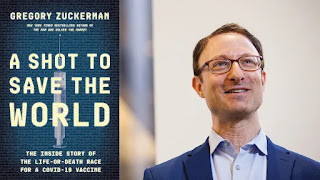 Amidst all of the noise and debate about vaccine mandates, less than clear information from the CDC, and the broader context of healthcare and society, it’s easy to forget that these vaccines are truly miracles of modern science, and that the herculean effort to develop them in record time, is a science story for the ages.
Amidst all of the noise and debate about vaccine mandates, less than clear information from the CDC, and the broader context of healthcare and society, it’s easy to forget that these vaccines are truly miracles of modern science, and that the herculean effort to develop them in record time, is a science story for the ages.
But the story doesn’t exist without the understanding the players. The global panoply of scientists, entrepreneurs, government officials and market forces that all came together in a kind of war effort that saved millions of lives. After all, imagine the debate we’d be having today, and what our society would look like, if no vaccine had happened?
This story, one of the rare ones about what went right in the COVID battle, is told by Gregory Zuckerman in A Shot to Save the World: The Inside Story of the Life-or-Death Race for a COVID-19 Vaccine.
Tuesday Nov 02, 2021
How the Index Fund Changed Finance and Why It‘s Still So Powerful Today
Tuesday Nov 02, 2021
Tuesday Nov 02, 2021
They think they can outperform markets that have long humbled the smartest guys in the room.
So back in the early seventy, a group of those guys got together to imagine and evolve a way to passively participate in the markets. Long before information about the markets had been democratized. Long before we checked our portfolio every-time we checked our phone, the idea of passive index funds would take hold.
And even in our hyperbolic financial world today, they are still going strong. In fact, they are so powerful, they alone can move markets.
What this all means for markets and economics is worth examining. To do so I’m joined by Robin Wigglesworth, the global finance correspondent at the Financial Times and the author of Trillions: How a Band of Wall Street Renegades Invented the Index Fund and Changed Finance Forever
Thursday Oct 28, 2021
Dirty, but Essential Work: A Conversation with Eyal Press
Thursday Oct 28, 2021
Thursday Oct 28, 2021
The pandemic has brought new light to these workers. Often, in what has been called essential work. It has highlighted and personified the work we often don’t see, but that we all rely on for keeping the wheels of society working.
Studs Terkel said that “work is about a search for daily meaning as well as daily bread, for recognition as well as cash, for astonishment rather than lethargy; in short, for a sort of life rather than a Monday through Friday sort of dying." And yet for millions of workers this dying that Terkel talked about, is what they face, day in and day out.
We can't imagine what it does to them, but also what it does to our society. This is what Eyal Press examine in Dirty Work: Essential Jobs and the Hidden Toll of Inequality in America.
Monday Oct 18, 2021
Looking for America: My Conversation with Evan Osnos
Monday Oct 18, 2021
Monday Oct 18, 2021
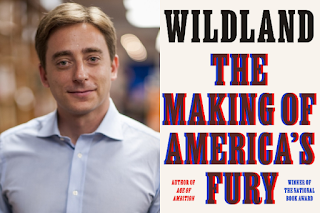 Without comparing one historical era to another, suffice it to say that we live in a nation filled with anger, despair and at best anxiety. Our ideological, economic and cultural divisions have infected every fiber of the public square. And all of this is happening amidst loss of faith in our once valued institutions, both public and private. A loss of faith in facts and truth, and in the fundamentals founding principles of self governance of fairness and selflessness.
Without comparing one historical era to another, suffice it to say that we live in a nation filled with anger, despair and at best anxiety. Our ideological, economic and cultural divisions have infected every fiber of the public square. And all of this is happening amidst loss of faith in our once valued institutions, both public and private. A loss of faith in facts and truth, and in the fundamentals founding principles of self governance of fairness and selflessness.
But we didn’t get here overnight, nor did some external forces (no not even Donald Trump) create this environment.
NY staff writer Evan Osnos went, like Simon and Garfunkel, looking for America. He looked in the mix of places he knew best, Greenwich, Connecticut where he grew up, Clarksburg West Virginia where he worked as a young reporter, and Chicago, the very definition of urban America.
The result of that effort is his new book Wildland: The Making of America's Fury
Friday Oct 08, 2021
What Is The Future of Transportation? Hint...It‘s Not A Better Car
Friday Oct 08, 2021
Friday Oct 08, 2021
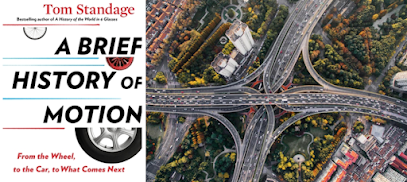 A recent survey showed that the reason people are reluctant to go back to the office has nothing to do with COVID, but with their commute. It’s not the office they object to, it’s getting there.
A recent survey showed that the reason people are reluctant to go back to the office has nothing to do with COVID, but with their commute. It’s not the office they object to, it’s getting there.
Particularly in places like New York, San Francisco, Atlanta and Washington DC, commute times have exploded in recent years.
Perhaps when the dust settles, perhaps what we will have changed as a result of a year at home, is less how we work, and more how we move about.
But will we ever give up our love affair with the automobile? Will new generations approach transportation in a new way? Are flying cars ever going to be a thing? And what can we learn from the last great inflection point as we went from the horse to the car?
All of this is part of Tom Standage’s new book, A Brief History of Motion: From the Wheel, to the Car, to What Comes Next.
Thursday Sep 30, 2021
Thursday Sep 30, 2021
 I suppose even the most ardent technologists have at times wanted to get off the grid...usually that urge doesn't last long. But for the people of Green Bank, West Virginia, it’s an ongoing state of affairs.
I suppose even the most ardent technologists have at times wanted to get off the grid...usually that urge doesn't last long. But for the people of Green Bank, West Virginia, it’s an ongoing state of affairs. Monday Sep 27, 2021
Monday Sep 27, 2021
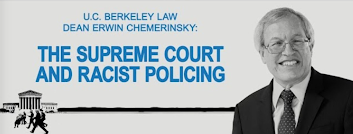 While the issue of systemic racism, along with a long history racial conflict occupies a large portion of our social and political landscape, the issue of racial influence in law enforcement and the problem of police violence directed at people of color, holds a unique place in our history.
While the issue of systemic racism, along with a long history racial conflict occupies a large portion of our social and political landscape, the issue of racial influence in law enforcement and the problem of police violence directed at people of color, holds a unique place in our history.How the courts have undermined a foundational tenant of their very existence tells us a lot about how we got where we are today. Erwin Chemerinsky, the Dean of the UC Berkeley School of Law expands on this idea in Presumed Guilty: How the Supreme Court Empowered the Police and Subverted Civil Rights.
Saturday Sep 18, 2021
Saturday Sep 18, 2021
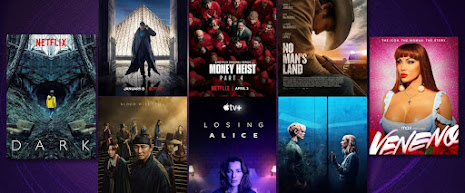 It wasn’t very long ago that to see a foreign language film, you wound up in the smallest theater in the multiplex or a little art theater somewhere in a college town...or you lived in New York or San Francisco or Boston. But like everything else, creative destruction has done its job. Streaming and the long tail of the internet has moved to supplant cable, movie theaters, broadcast television, and even the English language as the talisman of all of our entertainment.
It wasn’t very long ago that to see a foreign language film, you wound up in the smallest theater in the multiplex or a little art theater somewhere in a college town...or you lived in New York or San Francisco or Boston. But like everything else, creative destruction has done its job. Streaming and the long tail of the internet has moved to supplant cable, movie theaters, broadcast television, and even the English language as the talisman of all of our entertainment. Is this just a temporary blip due to COVID and the pandemic, or has global entertainment undergone a tectonic shift that both reflects and might reshape our culture? We’re going to talk about this with Scott Roxborough.
Tuesday Sep 14, 2021
The News About the News: A conversation with Martha Minow
Tuesday Sep 14, 2021
Tuesday Sep 14, 2021
 For journalism, it may be the best of times and the worst of times. On the one hand, the national media is more vibrant than ever. The New York Times, The Washington Post, and The Wall Street Journal, as well as broadcast and cable news networks are thriving. For these outlets, the transition to digital has been painful, but successful and is still ongoing. It was recently announced by CNN and NBC News that they would be moving to a streaming model.
For journalism, it may be the best of times and the worst of times. On the one hand, the national media is more vibrant than ever. The New York Times, The Washington Post, and The Wall Street Journal, as well as broadcast and cable news networks are thriving. For these outlets, the transition to digital has been painful, but successful and is still ongoing. It was recently announced by CNN and NBC News that they would be moving to a streaming model.For local news, however, the story is different. For what’s happening in your neighborhood, your school board, your city council, is a very different story. Thousands of local newspapers and local radio stations have shut down. The economics of the enterprise has proven to be unsustainable, and even large regional papers in places like LA, Chicago, and Miami have proven to be problematic. While many of the best of these papers have been stripped and plundered by hedge funds, let’s also remember that many were acquired by the hedge funds out of bankruptcy.
All of this begs the question as to whether our political, cultural, and social divide stems from the top as is assumed, or whether the hollowing out of news in our communities, something that should be bringing us together, is at the heart of what’s wrong? If so, does the government have a role to play in fixing that effort? Is the problem with the product, with the public, or as it is often so easy to do, should we just blame social media? Understanding this is the work that Martha Minow takes on in Saving the News: Why the Constitution Calls for Government Action to Preserve Freedom of Speech.
Saturday Sep 04, 2021
The Myth of ”Nobody Saw it Coming”
Saturday Sep 04, 2021
Saturday Sep 04, 2021
 The more we know about disasters, the more we realize that most were preordained. Covid 19 or Katrina, the current fires in California or the deep freeze this past winter in Texas. None of them were what we would call Black Swan events.
The more we know about disasters, the more we realize that most were preordained. Covid 19 or Katrina, the current fires in California or the deep freeze this past winter in Texas. None of them were what we would call Black Swan events.
We are certainly, because of climate change, complexity and complacency, going to be experiencing more such events, we had better become much better at disaster preparedness.
If we know these disaster events are coming, how can we get better at dealing with the consequences? Fire season is yet to reach its peak this year, hurricanes are starting early and we know that more infrastructure and buildings will collapse.
Therefore, the area of disaster management should be one of our number one priority, just as it has been for my guest Dr. Samantha Montano, the author of Disasterology: Dispatches from the Frontlines of the Climate Crisis
Tuesday Aug 31, 2021
Tuesday Aug 31, 2021
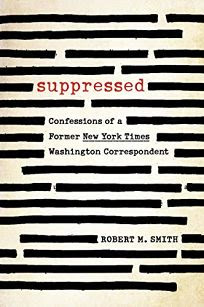 Survey after survey shows that trust in the news media is at an all time low. And it’s not just the left/right divide.
Survey after survey shows that trust in the news media is at an all time low. And it’s not just the left/right divide.
A recent study by the American Press Association reveals that not all Americans universally embrace core journalistic values, and that the trust crisis might best be understood through people’s moral values even more than their politics.
When journalists say they are” just doing their jobs,” the problem is many people harbor doubts about what that job should be.
Couple this with an ever changing media landscape driven by economics, the political bifurcation of news via the long tail of the internet, the news/entertainment nexus, celebrity culture, and now cancel culture, and it makes for an environment that has very little to do with getting at the truth. Maybe democracy dies not in darkness, but in the chaos of competing truths.
This is the world that long time journalist Robert M. Smith explores in Suppressed: Confessions of a Former New York Times Washington Correspondent.
Tuesday Aug 24, 2021
America Is No Longer A Serious Nation: My conversation with Tom Nichols:
Tuesday Aug 24, 2021
Tuesday Aug 24, 2021
 Almost everywhere in the world, liberal democracy is, if not under siege, or at least being tested. Only in rare historical times have would-be autocrats found such fertile ground. But why?
Almost everywhere in the world, liberal democracy is, if not under siege, or at least being tested. Only in rare historical times have would-be autocrats found such fertile ground. But why? Friday Aug 20, 2021
Roger Bennett Teaches Us About Soccer AND About America
Friday Aug 20, 2021
Friday Aug 20, 2021
 From Alexis de Tocqueville, to Alexander Solzhenitsyn to John Lennon, it has often taken those born outside of America to help us understand and define America back to those of us that have grown up here. Those of us long engulfed in both the popular culture and political noise inherent in our society, often can’t see the proverbial forest from the trees.
From Alexis de Tocqueville, to Alexander Solzhenitsyn to John Lennon, it has often taken those born outside of America to help us understand and define America back to those of us that have grown up here. Those of us long engulfed in both the popular culture and political noise inherent in our society, often can’t see the proverbial forest from the trees.Sunday Aug 15, 2021
The Second American Revolution - Will it Ever Be Won?
Sunday Aug 15, 2021
Sunday Aug 15, 2021
 In the 1960s and early 1970s political and social battles were fought by people who were trying to reshape America. Sixty years later, we are still at war.
In the 1960s and early 1970s political and social battles were fought by people who were trying to reshape America. Sixty years later, we are still at war.
My guests on this week’s WhoWhatWhy podcast, David and Margaret Talbot, label that war the Second American Revolution. The issues revolved around armed conflict abroad (Vietnam), civil rights, feminism, gay rights, Native American rights, workers rights, and the role of celebrities in the political process.
One of the Talbots’ conclusions is that the past is not just prologue — It’s not even the past.
They argue — in this conversation and in their new book, By the Light of Burning Dreams — that the ’60s were a time when every cultural and political progressive action was met with an equal reaction. A time when the FBI engaged in the kind of widespread, invasive surveillance that makes even today’s Pegasus project seem like child’s play.
The Talbots remind us that charismatic leadership, not just grassroots efforts, catalyzed the political and social activism of the ’60s. Leaders had to put their bodies on the line in the streets, not on social media.
Discussing how these efforts morphed from the optimism of the early ’60s to the weary cynicism of today, the Talbots draw a sobering lesson in By the Light of Burning Dreams: The Triumphs and Tragedies of the Second American Revolution.
Thursday Aug 05, 2021
The Ultimate Corporate Delusion: The Story of WeWork
Thursday Aug 05, 2021
Thursday Aug 05, 2021
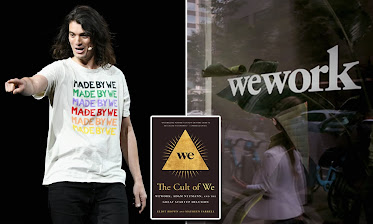 If someone pitched the story idea of a guy who was a former baby clothes salesman who then started a company that sublet co-working office space to millennials, and that that company would then become the most well financed startup ever, and that the story of its eventual rise and fall would give birth to an Apple tv series, a Hulu documentary, an HBO movie, several books, and two podcast series, the pitch would be rejected immediately.
If someone pitched the story idea of a guy who was a former baby clothes salesman who then started a company that sublet co-working office space to millennials, and that that company would then become the most well financed startup ever, and that the story of its eventual rise and fall would give birth to an Apple tv series, a Hulu documentary, an HBO movie, several books, and two podcast series, the pitch would be rejected immediately.
And yet this is the story of Adam Neumann and WeWork. But it’s also a story of Silicon Valley, of Wall Street, of international investors, of obsessions with millennials, of portfolio theory taken too far, and it all comes together to create the perfect corporate storm.
While there are some bad and greedy actors in this story, I would argue it's one with no heroes, and no real villains….because it exists, like many of our greatest corporate dramas, inside the protective bubble of a unique moment in place and time. -
Telling this story, as more than just the story of Adam Neumann and a failed business model, but telling it in the context of all of the aforementioned moving parts, is WSJ reporter Maureen Farrell in The Cult of We: WeWork, Adam Neumann, and the Great Startup Delusion.
Sunday Aug 01, 2021
Trump's Final Days: My conversation with Carol Leonnig
Sunday Aug 01, 2021
Sunday Aug 01, 2021
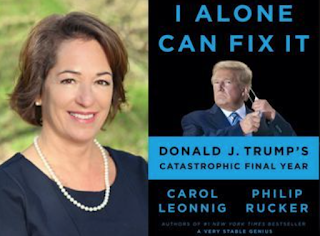 If daily news reporting is the first draft of history, books that come out almost contemporaneously to events are I suppose the second draft.
If daily news reporting is the first draft of history, books that come out almost contemporaneously to events are I suppose the second draft.
But today the world is speeded up. Today, especially in the wake of Trump, we need the facts much sooner. We need to learn not just how to escape the mistakes of history but to escape their repetition and to learn quickly from the actions of recent times.
Pulitzer prize winning Washington Post reporters Phil Rucker and Carol Leonnig have become the modern masters of this genre. With their first book A Very Stable Genius, early in the Trump presidency, they telegraphed what was ahead. No one that read their book could have been surprised at what happened next.
And now with their latest, I Alone Can Fix It: Donald J. Trump's Catastrophic Final Year they have given us a narrative history of the troubled final days of the Trump presidency, and maybe the final days of democracy as we've come to know it.
My conversation with Carol Leonnig:
Thursday Jul 29, 2021
Thursday Jul 29, 2021
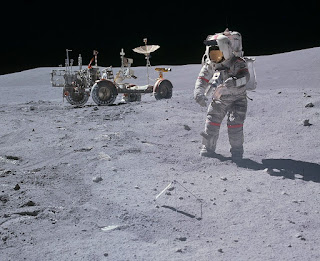 While everyone has their own personal list, we could all maybe agree on some of the most iconic cars ever made. The VW Beetle, the 1968 Ford Mustang, the 1960 Corvette, the 57 Chevy, the Porsche 911, The 1955 Mercedes gull-wing, the DeLorean, and just for good measure, the 1963 Aston Martin.
While everyone has their own personal list, we could all maybe agree on some of the most iconic cars ever made. The VW Beetle, the 1968 Ford Mustang, the 1960 Corvette, the 57 Chevy, the Porsche 911, The 1955 Mercedes gull-wing, the DeLorean, and just for good measure, the 1963 Aston Martin.
But equally important is a vehicle that gets little attention, All of its models together only traveled under 100 miles. When it was built it was over budget, over schedule, and was only a two-seater. It was the lunar rover vehicle that was a part of Apollo 15, 16, and 17. Without it, we’d know a lot less about the moon, about our own planet, and even the solar system. Not bad for a car that was bare bones and electrified, long before Elon Musk was born.
That’s the story that Earl Swift tell in his new book Across the Airless Wilds: The Lunar Rover and the Triumph of the Final Moon Landings.
Friday Jul 23, 2021
Bill Gates Has Always Shown Us Who He Is: A Conversation with Tim Schwab
Friday Jul 23, 2021
Friday Jul 23, 2021
 Two years ago if you convened a focus group to give an opinion on Bill Gates and his foundation, the response would have been overwhelmingly positive. Today, not so much.
Two years ago if you convened a focus group to give an opinion on Bill Gates and his foundation, the response would have been overwhelmingly positive. Today, not so much. Investigative journalist Tim Schwab, argues that none of this is as bad or as global as some of the actions of the Bill and Melinda Gates Foundation. Tim and all of this out in his recent articles in The Nation and in a book he's working on about Gates and his foundation.
Sunday Jul 18, 2021
Sunday Jul 18, 2021
 When Hal asked Astronaut David Bowman to “open the pod bay doors,” it was as if our most primal fear of machines came rushing headlong into the 20th century. Today, in our 21st-century world, we understand the basics of the artificial intelligence behind HAL.
When Hal asked Astronaut David Bowman to “open the pod bay doors,” it was as if our most primal fear of machines came rushing headlong into the 20th century. Today, in our 21st-century world, we understand the basics of the artificial intelligence behind HAL.
We see on display every day our interaction with Siri and Alexa, our reliance on algorithms in flying our planes and soon our self-driving cars.
It’s the full blossoming of the promised brave new world.
But AI is just the Internet in1995. While it dominates every conversation about technology, commerce, the workplace and the economy today, there is an awful lot of misinformation.
Its impact can be felt in manufacturing, retail, healthcare, automotive, robotics, finance and science, as well as defense and national security.
The academic progress of AI is taking place every day in places like Stanford, Google, Amazon and Facebook. And the proverbial elephant in the room with respect to AI is always China and its deep, rich and no holds barred commitment to be the world leader in AI
But nothing beats understanding AI’s future like seeing how we got where we are today, who are the people making it happen and what it portents for its future.
That is what NY Times journalist Cade Metz does in his book Genius Makers: The Mavericks Who Brought AI to Google, Facebook, and the World
Monday Jul 12, 2021
How We Got To Globalization Today: A Conversation with Jeffrey Garten
Monday Jul 12, 2021
Monday Jul 12, 2021
But 28 years later the children would grow up. The other economies of the world would come into their full inheritance. So much so that by the time of the Nixon administration, in 1971, it had to accommodate the change.
What happened next, as Nixon and his economic advisers would meet secretly at camp David, in August of 1971, set the stage for the modern era of globalization.
The gold standard would be abandoned, and a new world economic order would be born. I think it’s fair to say that it’s impossible to understand the global economy today without understand this singular moment
Jeffrey Garten, the Dean emeritus of the Yale School of Management, takes us back to this moment in his new work Three Days at Camp David: How a Secret Meeting in 1971 Transformed the Global Economy
Thursday Jul 08, 2021
A Constitution of Knowledge: A Conversation with Jonathan Rauch
Thursday Jul 08, 2021
Thursday Jul 08, 2021
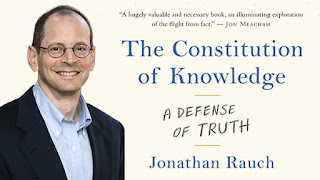 Some days it seems that everything we’ve taken for granted with respect to the functioning of America and American democracy is under siege. Hundreds of thousands of words are written and spoken almost every day as to why. However, before we can even begin to answer that question, we must understand what it is that’s being attacked and how the system was built before we can shore it up. It’s like a building after an explosion or a natural disaster. It can’t be righted until someone comes in, looks at the blueprints, develops engineering plans, and lays out the construction work. Today, the American experience feels like it’s in exactly the same place.
Some days it seems that everything we’ve taken for granted with respect to the functioning of America and American democracy is under siege. Hundreds of thousands of words are written and spoken almost every day as to why. However, before we can even begin to answer that question, we must understand what it is that’s being attacked and how the system was built before we can shore it up. It’s like a building after an explosion or a natural disaster. It can’t be righted until someone comes in, looks at the blueprints, develops engineering plans, and lays out the construction work. Today, the American experience feels like it’s in exactly the same place.
Jonathan Rauch, digs out those dusty blueprints in his new book The Constitution of Knowledge: A Defense of Truth

